A common viral infection caused by the herpes simplex virus or HSV, cold sores are an unwelcome sight on anybody’s face. They often show up at the most unfortunate of times too, sometimes breaking out before a big day in the office or a big day in your life, like weddings or a big date. Cold sores, or fever blisters as they are sometimes called, usually appear around the area of the mouth and lips and is characterized as red and swollen blisters.
[the_ad_placement id=”in-text-1-type-r”]Taking a look into their progression, cold sores start out as a mild discomfort around the lips and mouth gradually appearing as smallish, fluid-filled white blisters before ripening into painful, swollen, red blisters. These ulcers will break or erupt after a couple of days, oozing out the clear liquid inside and then closing or scabbing occur over the sore which lasts for days or weeks to some.
The pain caused by cold sores varies from person to person, from ant-bite levels to splitting-your-head magnitude. The outward appearance of cold sores often makes people confuse them with canker sores, which are a completely different type of skin ulcer. Cold sores and canker sores actually share the same preliminary symptoms but the cause and way of treatment and preventive measures are very different.
Differences between canker and cold sores
Canker and Cold sores have the same symptoms, which makes it hard to tell which is which. Both of them will have the same burning sensation around mouth and the pain that goes with this sensation. Differentiating them is quite easy as long as you understand where the differences lie.
The first difference is the location; cold sores often appear around the sides of the mouth and lips whereas canker sores generally appear inside the lip and rarely manifest outside. The second difference is the cause; cold sores, as previously mentioned, are caused by the herpes simplex virus I, canker sores on the other hand, can be caused by anything from hormones to environmental conditions. Some old wives tales point to fever, kissing an infected person and unsanitary oral hygiene (the latter is probably true to most cases).
The general appearance once they ripen is possibly the most telling of all differences. Cold sores are red, fluid filled blisters that often cluster in groups while canker sores are open with varying central colors (red to yellow to gray) with a red border and can appear alone or in a group.
Canker sores, unlike cold sores, are also not contagious since it is not caused by a virus. This difference, in particular, debunks the popular myth that canker sores are infectious.
Causes
As discussed, cold sores are caused by the HSV-1 virus or in rare cases the HSV-2 variant. But how is this passed on from one patient to the next?
The virus often enters the body through open wounds around the mouth or through the transmission of saliva, usually during heavy kissing. Generally, cold sores infect the mouth but it can also enter the body through other means like the sharing of utensils, unsterilized medical equipment, kissing, touching the saliva of an infected individual and through oral sex, especially if the other person has genital herpes, which exhibits the same symptom and appearance albeit in another area of the body.
Probably the most common way of passing the infection is touching, especially if the infected person just touched their blisters before touching you.
The infection doesn’t always happen right away, in most cases, the blisters lay dormant for a very long while but once they do break out, they do so in a very painful manner. These pain-filled outbreaks are usually caused by several factors like heavy stress, relationship issues, fatigue, injuries, even hormonal changes and menstruation.
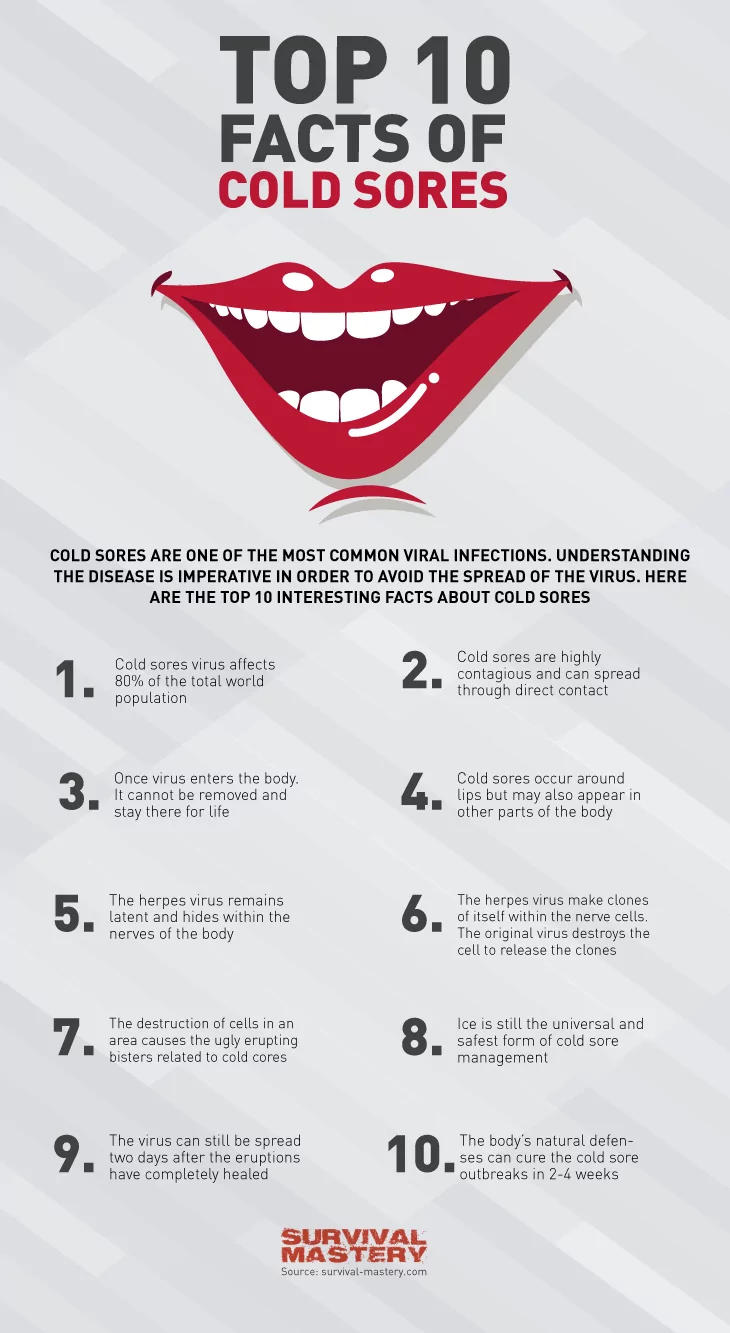
Not everybody who contracts the herpes simplex virus gets to have a cold sore though; some fortunate ones get the lazy, dormant kind that never break-outs but will always be present in their present. Outbreaks of cold sores can be recurring to most people, ranging from twice to thrice a year while some just experience one outbreak and that’s it.
Probably the most unfortunate part about getting the herpes simplex virus is that once you have it, you will always have it. There are several remedies for HSV out there, both natural and synthetic, but they medicate only the cold sore and offer no assurance of preventing the fever blister break-outs from recurring. See how our article on how honey can be an effective remedy as medicine, for survival and beauty.
Quick solutions: home remedies for cold sores
Cold sores last for about two weeks to most people and although the virus causing it may never be cured there are several ways for you to treat the blisters. Some of these can be done safely at home with some proper guidance of course. Here are a few bits of home remedies:
When you feel a slight burning sensation around your lips, immediately place ice on it to prevent further inflammation and clean it as well. Make sure to press the ice on top of the blisters as long as you can and dab the resulting water with hygienic wipes or cotton swabs.
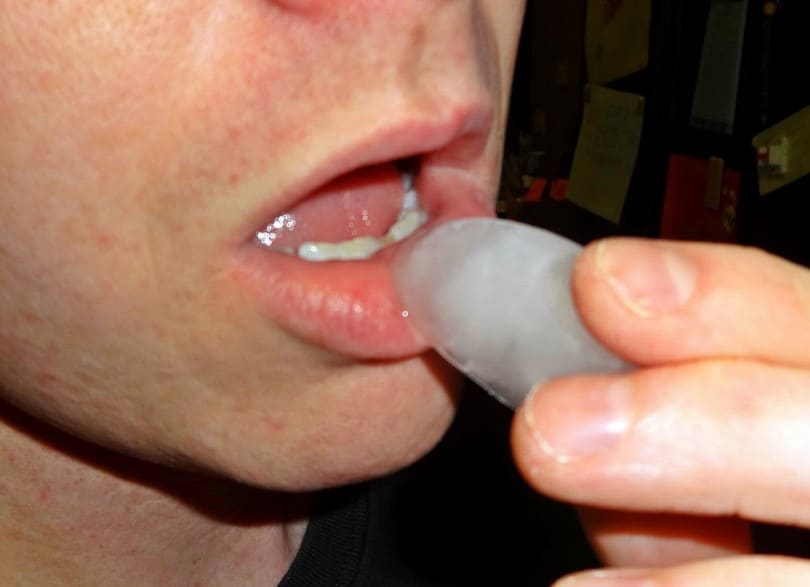
Never conceal the cold sore with make-up. Some of the chemical agents in most make-up aggravate cold sores, making it worse and even spreading the blisters farther.
Once fever blisters form around your mouth, immediately throw out your current toothbrush and replace it again once the blisters dry up and heal. Dental hygienists even suggest that you change your toothbrush everyday as long as you have cold sores. The reason behind such an expensive advice is that toothbrushes come in close contact with the infection and they help spread the infection from one side to the other, even to the insides of your mouth. This is especially true for blisters that have popped and the clear fluid is freely oozing out.
It is also advised that the area around the cold sore be kept moisturized as dry skin around the infection help spread it. Moisturize the area with lip balm, cold creams, petroleum jelly and/or anesthetic ointments. The latter not only keeps the area moisturized but it also helps keep it clean and sanitized.
When heading outside, especially during summer, always apply lip balm that has sunscreen protection on your lips and use facial sun block as well. This will help keep the moisture in and prevent the sun from irritating the infection. Don’t forget to check our article on the best sun hat you for your protection.

If the pain is causing severe discomfort or has become unbearable, take pain medication to address it. You may opt to use topical creams or you can consult your doctor regarding the best pain killer for your biological make-up. You can try aspirins, mefenamic acid and such but always seek advice as some contain ingredients that may cause more harm than heal.
Hydrogen peroxide can also be used in treating cold sores. This all-around chemical solution disinfects, speeds up the healing process and dries up the skin around the blister, thereby preventing it from spreading. This compound should be used with caution as too much of it can cause burns and discoloration.
For best results soak a cotton ball in one tablespoon of hydrogen peroxide for about 30 seconds and then press the cotton ball to the infected area. This will hurt as much as the cold sore but this will pass. Press for a minute or so and then dab it around the cold sore before leaving it alone for 5 minutes or more. Once the 5 minutes is up, rinse the area with running water.
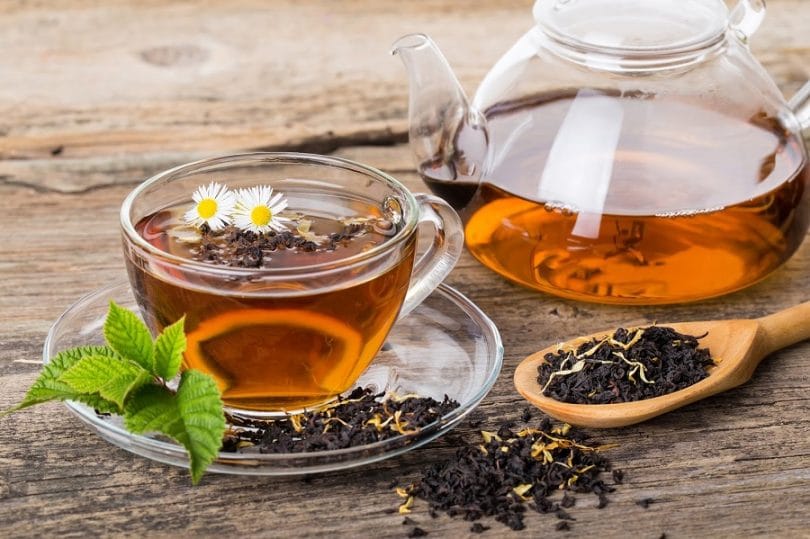
Adjust your sleeping position as well. For cold sores that have erupted, the fluid inside continuously flows out and sleeping flat on your back will increase the chances of the fluids making it inside your mouth. Stack your pillows up so you will end up in a semi-upright sleeping position so the fluids will have to flow downwards. Place some tissue or paper towel around your neck to absorb any fluid that will make it there.
[the_ad_placement id=”in-text-2-type-r”]The most important home remedy for cold sore is to not touch it, especially once the blisters have burst. The oozing liquid will get on your hands and anything else that you will touch. Make sure to wash your hands with soap and water after touching the cold sore. If soap and water is not available, you can use hand sanitizers and sanitary wipes.
Natural remedies for this annoying problem
Apart from home remedies listed above, you can also use natural remedies to cure these painful blisters. The solutions listed below are organic, easy to prepare and ensures that chemicals will not be able to worsen the infection.
Lip-balms help moisturize cold sores and lemon lip balms are much better. Studies have shown that lemon lip balm contain herbal properties that speeds up the healing process by 2-4 days. The active ingredient here is eugenol and it can calm muscles, numb tissues and more importantly, it kills bacteria that usually lounge around wounds and blisters. Lemon lip balms also contain tannin which has anti-viral properties and other enzymes that soothe the pain and burning sensation.
You may opt to buy prepared lip balms from herb stores and traditional medicine shops but you can also make lemon based natural cold sore remedy using common household ingredients like milk, lemon juice and salt. To prepare the treatment, mix together about a teaspoon of lemon juice, a splash of milk and some salt. The mixture should be dense enough to be rolled into a small, salty ball. Once the consistency is okay and the mixture has been rolled up, dab it on the cold sore at least once a day.
Repeat until the cold sore has dried up. The mixture can last for the entire treatment as long as it is stored inside the refrigerator. If there is a build-up of mold or dirt, immediately throw the ball away and make a new one.
In addition to the lemon-milk-salt ball, applying aloe vera gel or extract on the blister after the salt ball will soothe the burning sensation and alleviate any lingering pain. Aloe vera extract has been considered to be one of the most effective natural remedy for any skin problem from sunburns, to chicken pox and cold sores.
For cold sores, you have the option to buy ready-made aloe gels or you can take one aloe leaf, the more succulent the better, peel off the outer layer and apply the fleshy part directly to the cold sore. You can repeat the process as necessary but it is recommended that this be done at least once a day.
If you don’t have lemon and salt available but you have access to milk, you can still use it by soaking a cotton ball in a tablespoon of milk and dab it directly over the cold sore. Cold sores can also be treated using vanilla extract but make sure that you use natural vanilla extract and not the synthetic one often used in baking pastries and desserts. Vanilla is best used once you get that burning sensation around your mouth. Soak one cotton ball in a small amount of extract and apply directly to the cold sore.
Since vanilla extract is considered to be alcohol-based, it is most likely that the virus will find it hard to wreak havoc once the extract has been applied. The extract should be applied at least four times a day and doing so will reduce the number of days of infection by more than half.
Some experts attest to the benefits of chamomile tea in treating cold sores. A naturally occurring enzyme called bisabolol, which is also an alcohol, is extracted by letting the chamomile tea steep. Once ready for drinking, let the hot chamomile tea linger around the fever blisters. The discarded chamomile tea bag will also have bisabolol and it can also be used to treat cold sores. Just apply it directly once it cools down. Don’t steep the bags again though as they have become infected.
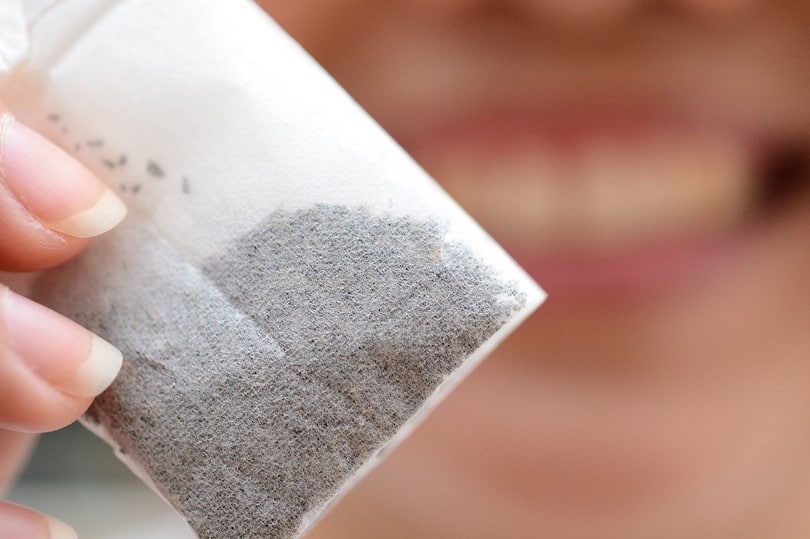
Herb experts and practitioners of traditional medicine also have their own list of herbs that alleviate one or more of the effects caused by cold sores. Herbal infusions like peppermint oil, lavender oil and melissa oil are applied to cold sores to address the infection and help moisturize the blisters. Saint john’s wart and witch hazel are also used as well as aloe gel as already discussed. Echinacea root has been extensively used too as the extracts of Echinacea root has antiviral properties.
Did you know that licorice can be used to treat cold sores? Yes, that licorice. Although you may want to take caution as to where the licorice was manufactured, some companies have replaced licorice powder with sugar extracts and will not help you with cold sores.
If the candy is not available in your location, you can make your own licorice ointment instead. This ointment is not made for consumption so make sure to story it in a cool, dry place. For the ointment, you will need about one tablespoon of licorice root extract or powder and half a teaspoon of clean water.
You can also use 2 teaspoons of petroleum jelly instead of water if you wish. In small increments, add the two ingredients together, mixing it until you get a consistency similar to most ointments. Apply it to the blisters as necessary. As an added bonus, the petroleum jelly adds its own healing properties to the mix, increasing the potency of this ointment.
[the_ad_placement id=”in-text-3-type-r”]As with most ailments, natural and home remedies would not be as effective if you do not consistently provide nourishment to your body. Eat as much as you can to help speed up the healing process but make sure to avoid acidic foods like citrus and tomatoes. Dishes with vinegar or other similar ingredients should also be avoided to prevent further infection.
It is recommended that you eat food that is rich in lysine, an amino acid that blocks another amino acid called arginine which promotes growth in viral infections. Meat, poultry, fish and beans are some of the food type that are rich in lysine but is low in arginine. In addition to eating lysine-rich food, you should also avoid foods that are rich in arginine like nuts, chocolate, seeds and whole grains.
Prevention
There is no standard procedure or behavior that will totally prevent the transmission of the herpes simplex virus but we can always do something about what triggers the adverse reactions. Stress can be managed thru a lot of ways as well fatigue. More often than not, fatigue and stress go away after a restful sleep and a day of relaxation. For some natural ways to beat anxiety when it hits, see our must-read article on this topic.
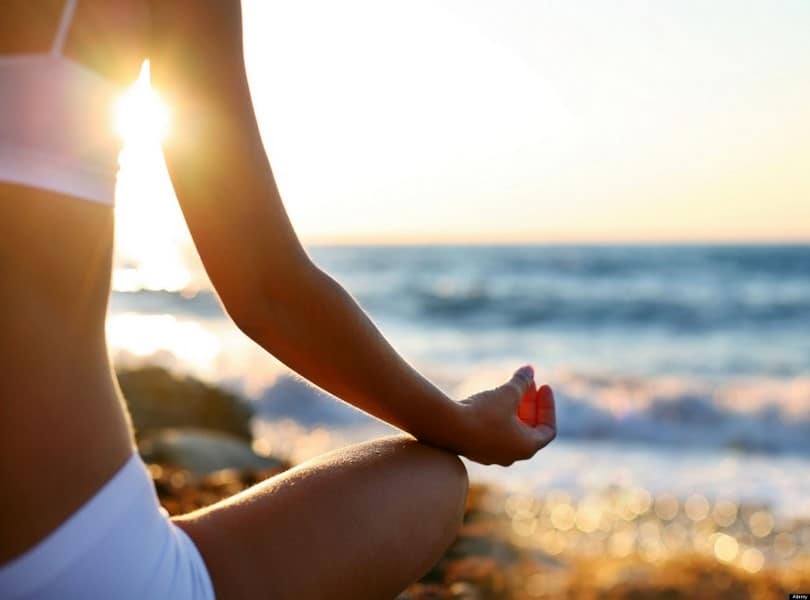
If at all possible, avoid kissing someone with cold sores and avoid sharing any utensils or items of personal hygiene with them. Oral sex is a big no-no, especially if the other person has genital herpes; just reassure them that everything will be back to normal as soon as their cold sores heal up.
Food supplements and multivitamins also play a big part in preventing cold sores. Choose those that are high in vitamins C and E as they help boost our immune system. Always wash your hands even if you don’t feel sick; frequent washing of hands is one of the best preventive measures for any communicable illness.






Cold sores can be a pain in the a**. This is a great article and I for one learned a few things about managing cold sores. I actually didn’t know the difference between cankers and cold sores at first but this enlightened me.
I’m glad it helped!
I hate cold sores, especially on the lips, I can’t eat properly. So when I have cold sores, I clean the area with a hydrogen peroxide and slather my lips with lysine ointment. My sister is quite sensitive too, but her sores once broke out really bad. If you are experiencing something like that, better go and ask the doctor for a prescription of an antiviral medicine.
I would be careful when using hydrogen peroxide as it can be poisonous to the body if it is misapplied.
Honey, ice and turmeric can be a quick remedies for cold sores. But not sure you can use them all at once?
Hi Lora,
It’s advisable to use one remedy at a time for effective results.
Anything with alcohol, it stings but dries it out in half the time. I use get one every now and then and they would last a week or lil longer . I started applying straight alcohol to sore a few times a day and the last couple of them I had was gone in 3-4 days. Plus it didn’t get big stayed small and didn’t look so bad.
Sheila,
Alcohol has that sting that some take as a sign that the compound is battling the bacteria already but if the sting becomes pain and it stays, consult a doctor immediately as you may have an allergic reaction to it.
Applying it to a wound or cold sore daily is good but it does dry out the skin, this is why I often recommend other alcohol based compounds that can also protect your skin from drying out.
Nora